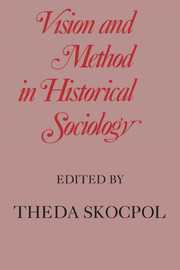Book contents
- Frontmatter
- Contents
- Preface
- 1 Sociology's Historical Imagination
- 2 The Social and Historical Landscape of Marc Bloch
- 3 Beyond the Economistic Fallacy: The Holistic Social Science of Karl Polanyi
- 4 Configurations in History: The Historical Sociology of S. N. Eisenstadt
- 5 Theoretical Generalization and Historical Particularity in the Comparative Sociology of Reinhard Bendix
- 6 Destined Pathways: The Historical Sociology of Perry Anderson
- 7 E. P. Thompson: Understanding the Process of History
- 8 Charles Tilly's Collective Action
- 9 The World System of Immanuel Wallerstein: Sociology and Politics as History
- 10 Discovering Facts and Values: The Historical Sociology of Barrington Moore
- 11 Emerging Agendas and Recurrent Strategies in Historical Sociology
- An Annotated Bibliography on Methods of Comparative and Historical Sociology
- Notes on the Contributors
8 - Charles Tilly's Collective Action
Published online by Cambridge University Press: 05 June 2012
- Frontmatter
- Contents
- Preface
- 1 Sociology's Historical Imagination
- 2 The Social and Historical Landscape of Marc Bloch
- 3 Beyond the Economistic Fallacy: The Holistic Social Science of Karl Polanyi
- 4 Configurations in History: The Historical Sociology of S. N. Eisenstadt
- 5 Theoretical Generalization and Historical Particularity in the Comparative Sociology of Reinhard Bendix
- 6 Destined Pathways: The Historical Sociology of Perry Anderson
- 7 E. P. Thompson: Understanding the Process of History
- 8 Charles Tilly's Collective Action
- 9 The World System of Immanuel Wallerstein: Sociology and Politics as History
- 10 Discovering Facts and Values: The Historical Sociology of Barrington Moore
- 11 Emerging Agendas and Recurrent Strategies in Historical Sociology
- An Annotated Bibliography on Methods of Comparative and Historical Sociology
- Notes on the Contributors
Summary
There is always something foolhardy about analyzing the work of an author who is in the prime of productivity, but discussing Charles Tilly calls for more than the usual caveats. No single piece stands out as the representative Charles Tilly work, yet the size and rate of growth of his production makes any global treatment impossible. In their emphases, Tilly's books and articles range from the clearly delimited historical case analysis of The Vendeé to the broad theoretical discussion of From Mobilization to Revolution Moreover, Tilly's impact on historical sociology is by no means limited to his published scholarly work, for he is unusually influential as a teacher and collaborator. Much of this influence can be attributed to Tilly's distinctive research style and in particular to his creation of a present-day atelier or historical-sociological workshop at the University of Michigan.
The Center for Research on Social Organization has provided Tilly with a research format that is unique among historical sociologists. With extensive government funding he has been able to initiate long term, quantitative projects that far exceed the resources available to scholars working in a more artisanal mode. The Center framework fosters collaborative efforts, and in recent years Tilly has published the results of several such endeavors, e.g., Strikes in France with Edward Shorter and The Rebellious Century with Louise Tilly and Richard Tilly.
- Type
- Chapter
- Information
- Vision and Method in Historical Sociology , pp. 244 - 275Publisher: Cambridge University PressPrint publication year: 1984
- 9
- Cited by



